In an unprecedented move, both the Afghan government and the Taliban have declared temporary ceasefires during the upcoming Eid al-Fitr holiday that marks the end of Ramadan. The Afghan government first declared its intent to cease offensive operations from June 12th until the end of Ramadan last week, presumably as part of President Ghani’s attempts to build on his peace initiative unveiled earlier this year.
More surprisingly, Taliban leaders responded two days later by announcing their own ceasefire, which will last from the 15th to the 18th of June. Much like the Afghan government’s ceasefire, which excludes “foreign” militant groups such as ISIL-KP, the Taliban’s truce does not extend to that group, or to the U.S.-led NATO forces backing the Afghan government. Nevertheless, this is the first time in the Afghan conflict that either side have ever agreed to a ceasefire, and so can only be regarded as a positive step as a result.
Political obstacles still abound
With a formal ceasefire by both sides being without historical precedent, there are those both in the Afghan government and the Taliban leadership who feel that these declarations are dangerous and misguided. That the Taliban are seemingly gaining the upper hand in the conflict gives plenty of reason for their commanders to see this as blunting their momentum. For Afghan Army commanders, ceasing operations while the Taliban are on the offensive and gaining increasing levels of control across the country means effectively ceding the initiative to them.
Beyond that, the war economy which commanders on both sides profit from give added incentives to oppose the truce. Whether the ceasefire can be maintained over the stated periods will be a significant test for how much loyalty the political leadership on both sides command among their officers and front-line soldiers.
However, if these obstacles are overcome, this could become a crucial trust-building exercise which can be built on and help prove the political value of the peace initiative going forward. According to an Afghan official, speaking on the condition of anonymity, the government is also willing to extend the ceasefire, so long as the Taliban continue to abide by its terms, a move that would be highly popular among war-weary Afghan citizens, well as a number of interested foreign governments, especially China (who is seeking to integrate Afghanistan into its One Belt One Road initiative).
Violence still likely
However encouraging, the talk of a temporary ceasefire will almost certainly be correlated with an immediate increase in violence, as commanders move to obtain advantages and establish control before the ceasefire is due to start. ISIL-KP will also no doubt see this as an opportunity to carry out further attacks and also appeal to Taliban commanders who are opposed to the truce. If the truce does not extend past Eid al-Fitr, it is also reasonable to assume an up-tick in violence will follow.
Marc Simms is an occasional blogger for Proelium Law LLP. Marc holds a MLitt in Terrorism Studies and a Masters in International Relations, both from St Andrews. His particular interests are in emerging international security issues, unconventional warfare and terrorism.
Need advice?
If you’d like further information, or to discuss working with us, please get in touch







